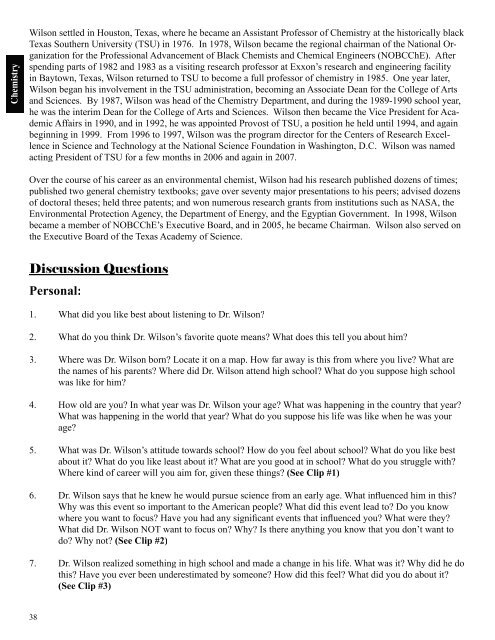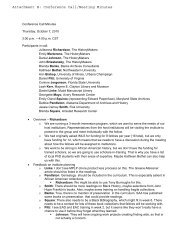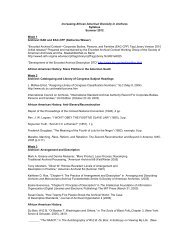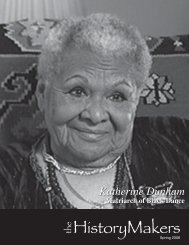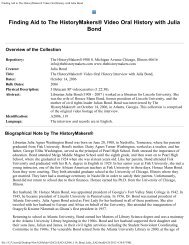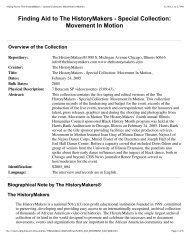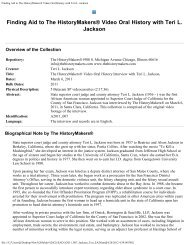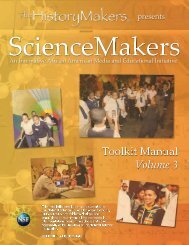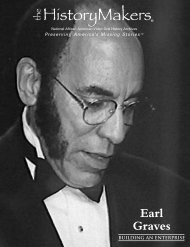ScienceMakers Toolkit Manual - The History Makers
ScienceMakers Toolkit Manual - The History Makers
ScienceMakers Toolkit Manual - The History Makers
Create successful ePaper yourself
Turn your PDF publications into a flip-book with our unique Google optimized e-Paper software.
Chemistry<br />
Wilson settled in Houston, Texas, where he became an Assistant Professor of Chemistry at the historically black<br />
Texas Southern University (TSU) in 1976. In 1978, Wilson became the regional chairman of the National Organization<br />
for the Professional Advancement of Black Chemists and Chemical Engineers (NOBCChE). After<br />
spending parts of 1982 and 1983 as a visiting research professor at Exxon’s research and engineering facility<br />
in Baytown, Texas, Wilson returned to TSU to become a full professor of chemistry in 1985. One year later,<br />
Wilson began his involvement in the TSU administration, becoming an Associate Dean for the College of Arts<br />
and Sciences. By 1987, Wilson was head of the Chemistry Department, and during the 1989-1990 school year,<br />
he was the interim Dean for the College of Arts and Sciences. Wilson then became the Vice President for Academic<br />
Affairs in 1990, and in 1992, he was appointed Provost of TSU, a position he held until 1994, and again<br />
beginning in 1999. From 1996 to 1997, Wilson was the program director for the Centers of Research Excellence<br />
in Science and Technology at the National Science Foundation in Washington, D.C. Wilson was named<br />
acting President of TSU for a few months in 2006 and again in 2007.<br />
Over the course of his career as an environmental chemist, Wilson had his research published dozens of times;<br />
published two general chemistry textbooks; gave over seventy major presentations to his peers; advised dozens<br />
of doctoral theses; held three patents; and won numerous research grants from institutions such as NASA, the<br />
Environmental Protection Agency, the Department of Energy, and the Egyptian Government. In 1998, Wilson<br />
became a member of NOBCChE’s Executive Board, and in 2005, he became Chairman. Wilson also served on<br />
the Executive Board of the Texas Academy of Science.<br />
Discussion Questions<br />
Personal:<br />
1. What did you like best about listening to Dr. Wilson?<br />
2. What do you think Dr. Wilson’s favorite quote means? What does this tell you about him?<br />
3. Where was Dr. Wilson born? Locate it on a map. How far away is this from where you live? What are<br />
the names of his parents? Where did Dr. Wilson attend high school? What do you suppose high school<br />
was like for him?<br />
4. How old are you? In what year was Dr. Wilson your age? What was happening in the country that year?<br />
What was happening in the world that year? What do you suppose his life was like when he was your<br />
age?<br />
5. What was Dr. Wilson’s attitude towards school? How do you feel about school? What do you like best<br />
about it? What do you like least about it? What are you good at in school? What do you struggle with?<br />
Where kind of career will you aim for, given these things? (See Clip #1)<br />
6. Dr. Wilson says that he knew he would pursue science from an early age. What infl uenced him in this?<br />
Why was this event so important to the American people? What did this event lead to? Do you know<br />
where you want to focus? Have you had any signifi cant events that infl uenced you? What were they?<br />
What did Dr. Wilson NOT want to focus on? Why? Is there anything you know that you don’t want to<br />
do? Why not? (See Clip #2)<br />
7. Dr. Wilson realized something in high school and made a change in his life. What was it? Why did he do<br />
this? Have you ever been underestimated by someone? How did this feel? What did you do about it?<br />
(See Clip #3)<br />
38


